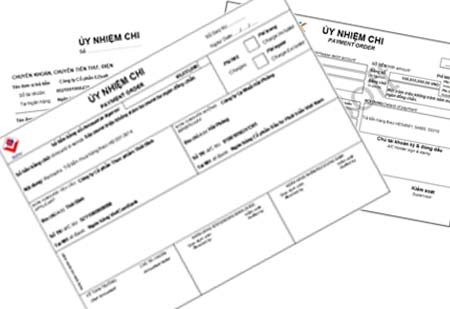What is an Authorization to Debit?
Payment authorization is a cashless payment method through organizations providing payment services.
Payment Order (or Remittance Order) is a payment instrument in which the payer (customer) creates a payment order according to the form prescribed by the payment service provider (bank) and sends it to the bank where they have their account, requesting the bank to deduct a certain amount of money from their account to pay to the beneficiary.
From the above concept, it can be understood as follows:
- The Payment Order is the authorization from the obligor to the bank. The form of authorization is pre-printed by the bank. The obligor fills out and signs this authorization;- The authorized party is the bank. From the perspective of banking law, the act of the payment service provider executing the payment order for the customer is a service provided to the customer for a fee;- The content of the authorization is to deduct money from the account of the obligor to pay the beneficiary the amount stated in that payment order.
Example: Mr. A purchases goods from Company B with the payment method of bank transfer. Mr. A will go to the bank (where he has an account) and create a payment order requesting the bank to deduct a sum of money from his account to pay Company B.
A payment order is only executed when the customer makes a request and fills out, signs the form. The bank only bases on that order to deduct money from the customer's account to transfer to the beneficiary. If the bank automatically deducts money from the customer's account, it is an act contrary to regulations unless there has been a prior written agreement.
When conducting transactions regarding payment orders, the bank should note the following:
- Upon receiving the payment order from the customer in the form of paper document or electronic document, the bank must check the validity and legality of the payment order, and also ensure the customer's payment capability;- If the payment order is invalid, illegal, or the amount stated in the payment order exceeds the balance in the customer’s payment account, the bank must promptly notify the creator of the payment order, return the payment order document, and refuse to execute that payment order if there is no other agreement between the parties;- If the payment order is valid, legal, and the amount stated in the payment order is ensured for payment, the bank must promptly execute the payment to the beneficiary, deducting the money from the customer's account into the beneficiary's account.
Refer to the payment process by payment order in Clause 2 Article 8 Circular 46/2014/TT-NHNN

Related documents:
Decree 101/2012/ND-CP on non-cash payments
Decree 80/2016/ND-CP amending the regulation on non-cash payments
- Number of deputy directors of departments in Vietnam in accordance with Decree 45/2025/ND-CP
- Cases ineligible for pardon in Vietnam in 2025
- Decree 50/2025 amending Decree 151/2017 on the management of public assets in Vietnam
- Circular 07/2025 amending Circular 02/2022 on the Law on Environmental Protection in Vietnam
- Adjustment to the organizational structure of the Ministry of Health of Vietnam: Certain agencies are no longer listed in the organizational structure
- Vietnam aims to welcome 22-23 million international tourists in Vietnam in 2025
-

- Notable new policies of Vietnam effective as of ...
- 16:26, 11/04/2025
-
.Medium.png)
- Notable documents of Vietnam in the previous week ...
- 16:21, 11/04/2025
-
.Medium.png)
- Notable documents of Vietnam in the previous week ...
- 16:11, 02/04/2025
-
.Medium.png)
- Notable new policies of Vietnam to be effective ...
- 16:04, 02/04/2025
-
.Medium.png)
- Notable new policies of Vietnam effective from ...
- 14:51, 21/03/2025
 Article table of contents
Article table of contents
